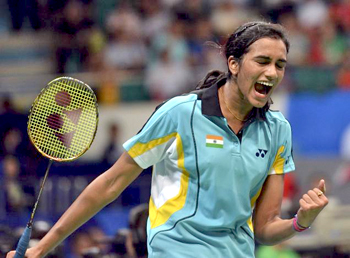Copenhagen, Aug 30: Indian teen sensation P V Sindhu assured herself of a second consecutive bronze medal at the World Championship but it was curtains for star shuttler Saina Nehwal after she suffered a straight-game loss in the women's singles quarterfinals on Friday.

Earlier this month, Sindhu had won a bronze at the Commonwealth Games in Glasgow, Scotland.
Earlier, Olympic bronze-medallist Saina, seeded seventh, struggled against World No. 1 Li Xuerui and the Chinese took just 45 minutes to send the Indian packing with an identical 21-15 21-15 scoreline.
However, Sindhu, seeded 11th, showed once again why she is considered one of India's finest shuttlers as she held her nerves in crucial moments during the energy-sapping battle to record her fourth win against Wang. Sindhu will now face the winner of the match between Chinese Taipei's Tzu Ying Tai and and Spaniard Carolina Marin.
In the quarterfinal contest that lasted for one hour and 25 minutes, Sindhu and Wang were locked in a battle of attrition and rode on each other's mistakes to gather points.
Sindhu dominated the net early on and used her height and reach well to lead 11-5 initially. However, Wang soon caught up at 15-15 before getting past the Indian to pocket the first game.
Frustrated by the first game loss, Sindhu stepped up her performance in the second and once again opened up a healthy 5-1 lead but Wang made her way back into contention at 6-6 with some precise net shots to lead 11-9 at the break.
A couple of unforced errors helped Sindhu to narrow the gap but the Indian faltered at the forecourt to help Wang keep the lead. The Indian kept fighting and used her smashes and better judgment of the shuttle to draw parity at 16-16.
Wang, however, faltered at the nets to allow Sindhu a 19-16 lead and then hit another miscued shot to give the Indian four-game points.
The Chinese saved three game points with a couple of brilliant shots from the back of the court but Sindhu finally managed to send one away from the outstretched right hand of Wang to bounce back into the contest.
The decider started with a long rally which Sindhu grabbed after Wang hit wide. The Chinese kept hitting wide and long and found the net allowing the Indian to lead 5-2. But Wang once again caught up at 5-5.
Both Sindhu and Wang committed too many unforced errors as the Indian managed to hang on to a fragile one-point lead at the breather with a smash which kissed the nets and fell over.
Back to her winning side, Sindhu grabbed the first point with a sharp smash but she found the net and misjudged the shuttle to allow Wang to draw level at 12-12.
While the Chinese used her deceptive drops and cross court net dribbles to gain points, Sindhu targeted Wang's weak back hand to lead 17-15.
Sindhu grabbed the next four points in a jiffy to not only slam the door on Wang but also assure herself of a consecutive bronze medal.
However, a medal at the prestigious tournament continued to elude Saina once again as she succumbed to her eighth defeat against Olympic champion and top seed Li in another quarterfinal contest that lasted for 45 minutes.
2010 Commonwealth Games gold medallist Saina, who had to fight her way back from a game down to register a 14-21, 21-18, 21-12 win over Sayaka Takahashi of Japan in the previous round, looked rusty from the start and was trailing Li in the entire first game.
Li took advantage of Saina's erratic play and raced to a 9-4 lead before the Indian brought the gap down to 10-8. But just when it seemed Saina was getting her act together, the Chinese recomposed herself and increased her lead to 18-11 before closing down the first game.
The second game was competitive till the first five points before the Indian pocketed four consecutive points to lead 9-5.
Saina maintained her four point lead till 12-8 before the Chinese shuttler earned four straight points to draw level at 12-12. However, Saina ran out of steam thereafter as she struggled to match her opponent, who raised her game considerably.
From 13-13, Li again won four consecutive points to take the lead for the first time in the game and then sealed the match in her favour without much ado. Li will play 16th seed Minatsu Mitani of Japan in the semifinals.
Stay updated on the go with The Times of India’s mobile apps. Click here to download it for your device.





Comments
Add new comment